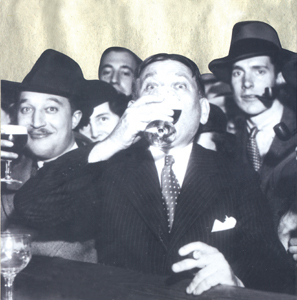![[Metroactive Books]](/books/gifs/books468.gif)
[ Books Index | Silicon Valley | Metroactive Home | Archives ]

H.L. Menken Collection Enoch Pratt Free Library Wordsmith: H.L. Mencken liked his language like his liquor: strong and straight to the gut. Scoping Out Mencken From Baltimore bars to the Scopes Monkey Trial, a new biography tracks the jabs and jests of journalist H.L. Mencken AT THE 1920 Republican Party convention, one journalist listened to the ineffable Warren Harding deliver himself of his thoughts: "I would like government to do all it can to mitigate; then, in understanding, in mutuality of interest, in concern for the common good, our tasks will be solved." The New York Times called these words "presidential." The auditor in question, Mr. Henry L. Mencken of Baltimore, chose a different description: "The worst English I have ever encountered. It reminds me of a string of wet sponges; it reminds me of tattered washing on a line; it reminds me of stale bean soup, of college yells, of dogs barking idiotically through endless nights." Now we are accustomed to the paper of record, numberless blogsters, TV newscasters and the lot all divining good intentions behind hideously mangled words. Mencken seems like a proto-martyr, whose ears were tortured for the sins of others. Like most people who use words as weapons, Mencken was, said a friend, "sensitive to the point of agony." Perhaps nothing tormented Mencken so much as listening to the twisting of his own native tongue. As his enthusiastic and compassionate biographer Mary Elizabeth Rodgers notes in Mencken, the American Iconoclast, the journalist, philologist and editor was a tireless worker and a hard partier. The well-off son of a cigar manufacturer, this born-and-bred Baltimoran skipped college and went straight into journalism, becoming the youngest managing editor of a major newspaper in American history. Mencken put much store in coming from a distinguished family from Leipzig. But he was no aristocrat—he had the stout physique of a butcher boy, and he counted bricklaying among his favorite hobbies. America's answer to Dr. Samuel Johnson was, like Johnson, a man of large appetites. He described himself as having the table manners of a Cro-Magnon. And he was a passionate beerheart. One of the saddest things Mencken wrote was three-dot threnody for bars shut by Prohibition, a piece titled "Bilder Aus Schoner Zeit":"... the Franziskaner Mai-Bock at Luchow's ... the very dark Kulmbacher at the Pabst place is 125th St. in the last days of civilization ... Michelob on warm summer evenings with the crowd singing 'Throw Out the Lifeline' ... Drinking Faust all night in St. Louis in 1904 ..." How tragic that he didn't live to see the triumph of the microbrewers. Before his marriage—short-lived, to a lady of chronic poor health—Mencken was a celebrated lover. Rodgers' list is impressive: among Mencken's girlfriends were the silent-film actress Aileen Pringle and the novelist Anita Loos. Loos commented, "Blondes preferred him." According to Rodgers, Loos made her Gentlemen Prefer Blondes heroine, Lorelei Lee, an Arkansan because of Mencken's blood-curdling essay "The Sahara of the Bozart" [Beaux-Arts, that is], about the lack of cultural life below the Bible Belt. Indeed, "Bible Belt" is another phrase credited to Mencken. Mencken's most famous assault on the South was his coverage of the 1925 Scopes Monkey Trial, where the tedious matter of evolution vs. creationism got its first airing. Mencken was practically the ringmaster at that media circus, and he wrote such pejorative things about Tennessee that one is astonished that he made it out of the state alive. While carrying on work for the Baltimore Sun, Mencken also edited the magazine The Smart Set in partnership with George Jean Nathan, a figure said to have inspired the character Addison de Witt in All About Eve. Rodgers includes an irresistible reproduction of one of the magazine's covers: a masked devil, the publication's mascot, hovers over a vintage cartoonish illustration of reveling musicians and tangoing dancers. It's all for the cover story, F. Scott Fitzgerald's "The Diamond as Big as the Ritz." Mencken's dark side could be easily guessed; the man regularly titled his books Prejudices. Though he opposed lynching and wasn't racist by the standards of the time, he had a thick anti-Semitic streak. As early as 1922, he was shrewd enough to predict the massacre of the German Jews. But it took the great Germanophile a long time to accept the evils of Nazism. Rodgers, a longtime Mencken scholar, rightly appreciates the man as a giant of American letters. And the book proves you can be both bitter and happy. My own quarrel with Mencken centers on his essay "On Being an American." It's not that I argue with his conclusions. True, a mediocrity can rise like a skyrocket here and live in comfort far outstripping his talent or worth. It's also true that someone who is ordinarily smart in America "stands out as brilliantly as a wart on a bald head," and that here, "The buffoonery never stops." But since our nation decided to lead the world, Mencken's usual suspects, the halfwit politicians and religious "wowsers" [reformers], now have the power to inflict themselves on the globe. In Mencken's day, when America was just a backwater, it might have been possible to laugh. Today, mourning seems more appropriate.
Mencken, the American Iconoclast: The Life and Times of the Bad Boy of Baltimore by Marion Elizabeth Rodgers; Oxford University Press; 672 pages; $35 cloth.
Send a letter to the editor about this story to letters@metronews.com. [ Silicon Valley | Metroactive Home | Archives ]
|
From the January 11-17, 2006 issue of Metro, Silicon Valley's Weekly Newspaper.
Copyright © 2006 Metro Publishing Inc. Metroactive is affiliated with the Boulevards Network.
For more information about the San Jose/Silicon Valley area, visit sanjose.com.